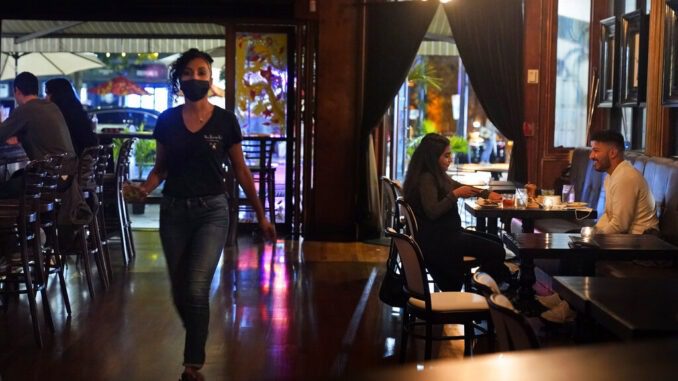
Phillip Opie Kirby, owner of Finnigan’s Wake, took to Facebook announcing the wildly popular Irish pub in downtown Winston-Salem that he founded and operated for the past 15 years is closing permanently.
The announcement comes on the heels of veteran restaurant owner Kris Fuller making the decision to shut down Crafted, also located in downtown Winston-Salem.
The news of both restaurants closing is unrelated and most likely driven by different variables, but they reveal an industry that is still roiling after nearly two years of coping with COVID-19 disruptions. Between rising costs for raw materials, staffing shortages and changes in consumer habits — restaurants have significant headwinds ahead as they navigate an entirely new environment.
COVID-19 touched down in America somewhere around March 2020 and unleashed a perfect storm of challenges for all food-and-beverage operators. Initially the business shutdowns were swift and unexpected, which led to unprecedented panic and anxiety. Fear subsided as government stepped in to provide massive federal aid to small businesses and out of work individuals.
Nevertheless, business owners believed the global pandemic would be short-lived and business as usual would resume quickly. Of course, Monday morning is a great time to play a Sunday night game. We all turned out to be deeply incorrect.
The emergence of a vaccine around early 2021 did provide a glimpse of “normal” as the fog of COVID-19 felt like it was lifting. Only to see ourselves caught in another “surge” once the summer arrived.
However, it’s no longer the virus and restrictions placed on communities that is challenging restaurants — it’s the after-effects of the public-health nightmare that appear to be far more harmful.
Unemployment skyrocketed in the early days of COVID-19 and sidelined workers received enhanced benefits to ensure they would be covered for the long haul. Couple those benefits with a moratorium on evictions, utility cutoffs and student loan payments — the average household’s financial obligations dropped suddenly. For those who used to cook, wash dishes, or serve impatient customers, they possibly were now earning more not working than pre-COVID-19.
Naturally as vaccinations increased and the economy started to reopen, many displaced workers were not eager to return to high stress and at-risk work environments such as restaurants and bars.
Not to mention many of these people actually used their time out of work wisely. Some returning to school for skills training while others accepted new positions in alternative industries. Amazon and Walmart, beneficiaries of a public health crisis that caused people to stay home and shop online, hired nearly 100,000 workers during the pandemic. Average starting wages of $17-to-$22/hour with benefits is a non-starter for your local corner grill owner slinging burgers and fries to price- conscious guests. They simply cannot compete with the tech giants.
Restaurant employees fed up with low pay, long hours and unappreciative managers, found their way to the “gig” economy, a term used to describe the labor market of short-term contracts and freelance work. The pandemic induced spike in online orders to Uber Eats, Door Dash, and GrubHub were filled by former line cooks, dishwashers, and bartenders.
Additional labor shortages at suppliers to the food and beverage industry have only exacerbated the pain for restaurant owners. The price of raw materials such as chicken, beef, pork, produce and disposables have climbed month after month with some distributors unable to provide basic food items such as okra or green beans. Recently at a local bakery, they literally did not have cake boxes for to go purchases.
In a recent market survey with restaurant owners across various service categories, nearly all participants expected to raise menu prices 15 to 20% in the fourth quarter.
Unfortunately the story doesn’t end there but is further conflated by shifting consumer behavior. Some customers remain apprehensive of entering a restaurant, either out of fear other guests are not vaccinated or that restaurant employees, often working in close quarters, may transmit the virus. So a higher-than-average percentage of customers still rely on takeout meals or third-party delivery service. Neither option is ideal for local fine-dining restaurants that are designed more for customers to dine in and not carry out.
COVID-19 triggered more consumers to embrace technology when considering meal choices. Nearly 50% of all Door Dash users have no idea what they want to eat when they login. Customers now use third-party apps simply to search and discover new restaurants in a virtual space. For less tech-and-branding savvy “mom and pop” owners, the change in buying habits may result in their obsolescence.
Kirby and Fuller’s announcements do have one thing in common. Both owners shared they were not closing out of necessity; the choice was voluntary. They just didn’t want to do it any longer. I’ve spoken with longtime restaurant veterans who are thinking about shutting the grill off a final time after being in business for decades. A common theme amongst them is pure mental and physical exhaustion with an industry that has been in what feels like a never-ending transition.
Undoubtedly more restaurants will shutter before all this is comes to a complete end, and that’s unfortunate for those owners, loyal customers and surrounding communities. Local residents must remain mindful of the adversity these small business owners, staff, and families are facing — so be patient, tip larger and dine in frequently.
You never know if your favorite restaurant might be the next one with an announcement.
Algenon Cash is the founding director of Triad Food & Beverage Coalition, a program dedicated to promoting a healthy food and beverage community.

